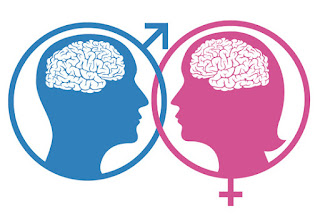It is important for us to acknowledge how women and men are not only different in their physical characteristics but even in their psychological makeup. Women's and men's brains are wired differently and they process stimuli and information in their own distinct ways when dealing in relationships, expressing their feelings, and reacting to stress. Thus, gender is a critical determinant in issues related to mental health. Various psychiatric studies indicate that men experience a significantly higher number of certain mental health issues than women, yet community studies of mental health find that women have reported worse mental health scores instead of men.
There is a significant correlation between women’s mental and reproductive health that has been finally receiving attention in these recent years. Reproductive health conditions are likely to impose a burden on women’s health. Apart from these biological, “lifestyle” and individual risk factors, the focus also needs to be given to the recognition of the broader economic, social and legal factors as contributory when it comes to discussing women’s mental health. Patriarchal society consists of structures that oppress women, play a huge role in their mental health, especially due to the roles, expectations, responsibilities and the ideas of expressing feminine identities.
Ethnographic interviews with men and women have suggested that the cultural expressions for communicating emotions of sadness, distress and anxiety used by men and women are subjective to the local contexts in which these adverse events are located. Experts have found a good amount of variation in the manner of men and women portraying their sense of loss. Women take greater effort to report expressed emotion and somatic symptoms while men use “flight” responses and show detachment.
In men, according to studies, work related stress or unemployment has a greater impact on their mental health than on women. This may be because traditionally, work has been a domain from where a man derives his sense of self-worth and identity. Work provides status, resources and income that have been used by men to support their families. Hence, discontinuity in the work domain will not only lead to severe financial strain but also a significant amount of psychosocial stress.
Sometimes health care providers, either implicitly or explicitly, tend to express gender biasthat may reinforce the belief that mental health services are not appropriate for men. Due to thismenend up downplaying the severity of their own mental health symptoms in a clinical encounter that might increase their problems than solve them.
Some scholars have suggested that mental health services have been inherently “feminized,” as they give importance to factors like emotional vulnerability, talk, and deep self-disclosure in healing which are all allegedly feminine traits. Some have argued that this is a consequence of a largely female workforce in such social work sectors. Some men might be comfortable consulting female health professionals but it has been suggested that many men may feel self-conscious in sharing their issues with women.
More men should be included in fields of social work or psychology and given opportunities to make it a more inclusive domain. Person-centered frameworks and treatment approaches specifically working towards understanding the diversity of men and masculinities is needed in order to provide gender-informed and specialised care.
Written by:
Kashvi Juneja
Intern, Brain Behaviour Research Foundation of India
References:
- Das, J., Das, R. K., &Das, V. (2012). The mental health gender-gap in urban India: patterns and narratives. Social Science & Medicine, 75(9), 1660-1672.
- Affleck, W., Carmichael, V., & Whitley, R. (2018). Men’s mental health: Social determinants and implications for services. The Canadian Journal of Psychiatry, 63(9), 581-589.
- Seidler, Z. E., Rice, S. M., River, J., Oliffe, J. L., & Dhillon, H. M. (2018). Men’s mental health services: The case for a masculinities model. The Journal of Men’s Studies, 26(1), 92-104.
- Malhotra, S., & Shah, R. (2015). Women and mental health in India: An overview. Indian journal of psychiatry, 57(Suppl 2), S205.


Wow, What a Excellent post. I really found this to much informatics. It is what i was searching for.I would like to suggest you that please keep sharing such type of info.Thanks Medical cannabis
ReplyDeleteThank you for some other informative website. The place else may just I get that kind of information written in such a perfect method? I have a venture that I am simply now running on, and I’ve been at the glance out for such info. Vein Treatment
ReplyDeleteThis comment has been removed by the author.
ReplyDeleteI really loved reading your blog. It was very well authored and easy to understand. Unlike other blogs I have read which are really not that good.Thanks alot! cms 1500 form fillable software
ReplyDelete